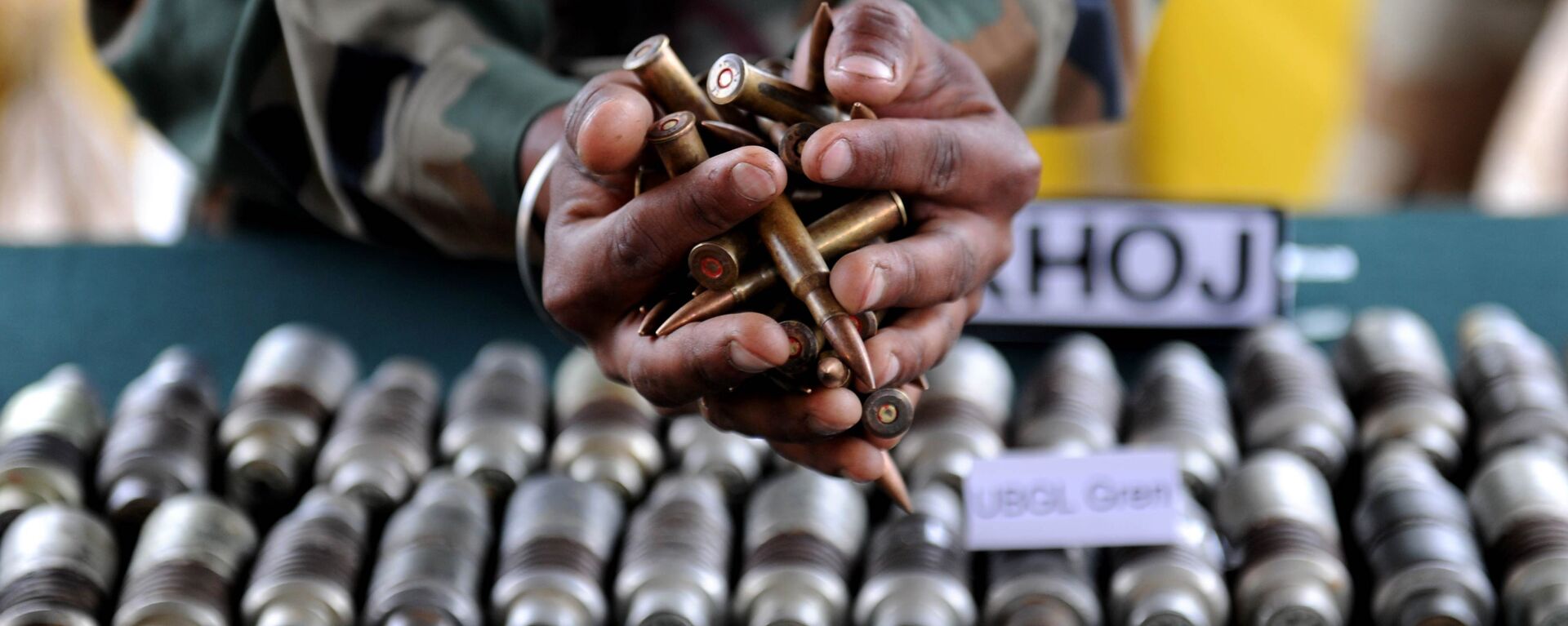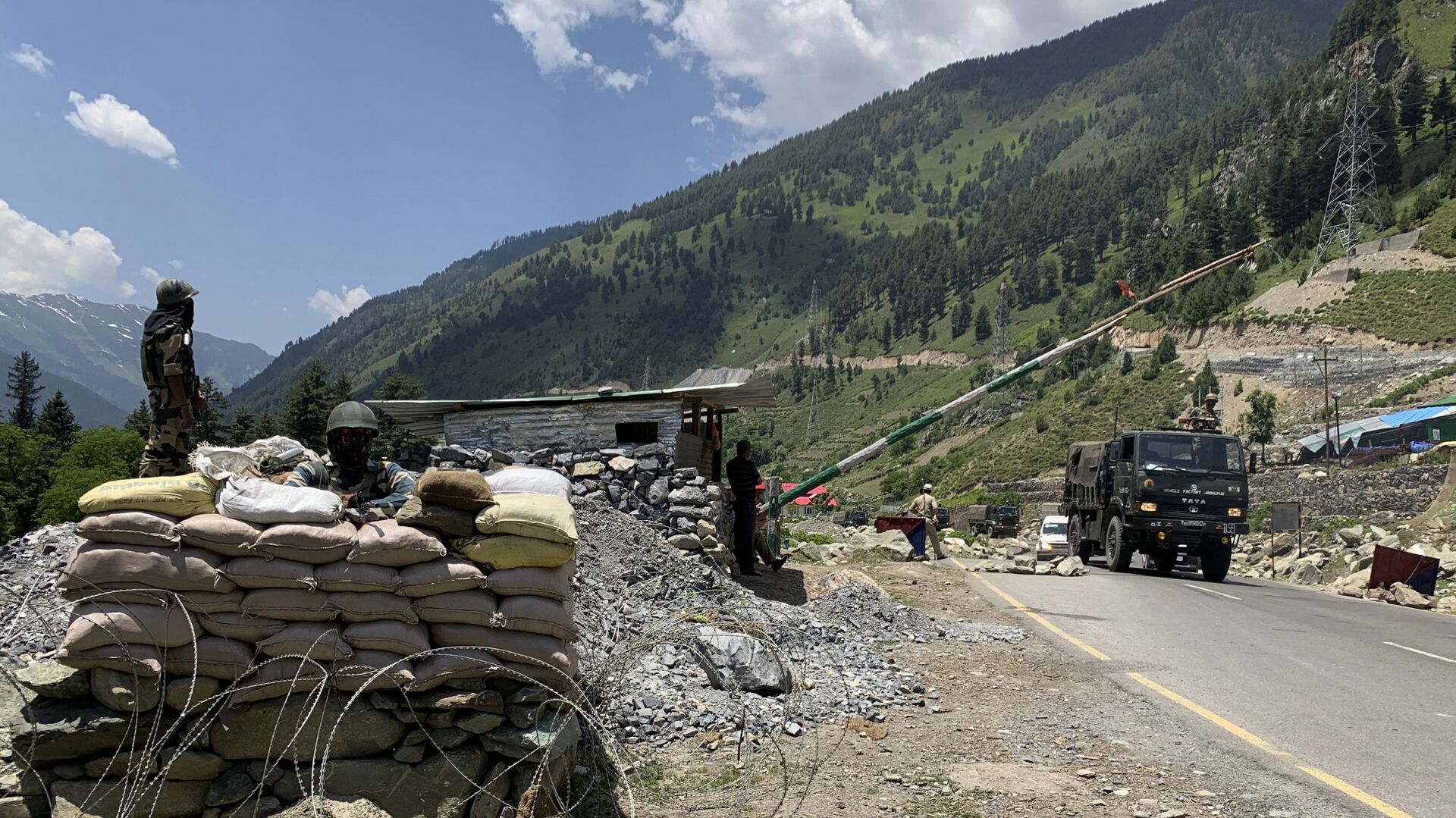https://sputnikglobe.com/20210919/indias-all-weather-border-outpost-project-fails-to-take-off-as-ministries-spar-with-each-other-1089206080.html
India's All-Weather Border Outpost Project Fails to Take off as Ministries Spar With Each Other
India's All-Weather Border Outpost Project Fails to Take off as Ministries Spar With Each Other
Sputnik International
From Ladakh in the north to Assam state in the far east, India has been repairing roads, bridges and tunnels along its border with China to facilitate the... 19.09.2021, Sputnik International
2021-09-19T09:16+0000
2021-09-19T09:16+0000
2024-01-05T15:13+0000
sputnik
infrastructure
defence
ladakh standoff
border
project
infrastructure
indian home ministry
paramilitary troops
indian army
https://cdn1.img.sputnikglobe.com/img/107976/42/1079764252_0:161:3071:1888_1920x0_80_0_0_2c0b079a6f55e94a439300ef181012a5.jpg
A key infrastructure project for Indian troops in strategically-located eastern Ladakh, where the country's soldiers remain in a standoff with China's People's Liberation Army (PLA), has failed to take off despite being in the works for five years and an investment of $2.7 million.The 'non-starter' status of the crucial project has led to an ugly blame game between the Ministry of Home Affairs (MHA) and Ministry of Jal Shakti (Water Resources).The project was envisaged in 2015, wherein 40 integrated all-weather Border Outposts (BOPs) were to be built for soldiers living in harsh and extreme weather conditions. Apart from running water and freeze-proof toilets, the temperature inside these structures was to be permanently maintained at 22 degrees Celsius or above.All-weather BOPs are vital for Indian troops staying in Ladakh as the region is a cold desert where temperatures dip to as low as minus 40 degrees Celsius. Even in the summer, the day temperature hovers around zero degrees, while the nights are extremely cold, with temperatures touching -30°C.The first of the BOPs was to be built on the western bank of Ladakh's Pangong Tso lake in Lukung for the Indo-Tibetan Border Police (ITBP), a paramilitary force tasked with guarding the 3,488 kilometre long undefined border with China. All paramilitary forces in India are under the Ministry of Home Affairs.It was in this area where thousands of troops from both armies were in an eyeball-to-eyeball confrontation for nine months until the two nations agreed to a disengagement in February. The project was to be executed by the National Projects Construction Corporation (NPCC), a public sector company under the Ministry of Jal Shakti, but after more than half a decade, the ITBP has declared it a failure.Officials in the Ministry of Home Affairs as well as the ITBP have blamed the quality of construction for the project's failure. While the temperature inside the BOP was to be maintained over 22 degrees at all times, the facility has struggled to even maintain 10-11 degree heat.NPCC's sub-standard work has led the MHA to stop paying them. But what could come as a major setback to the nation's armed forces, especially for troops who have lived in prefabricated huts for years, is that the MHA is now planning to completely scrap the project.On the other hand, NPCC has claimed that the MHA's decision to withhold payment is the prime reason behind the poor quality of construction as the sub-contractor doesn't have the required finances to maintain the BOP's heating system.According to D. P. Singh, NPCC's Head of Projects, ITBP has yet to clear bills of more than $680,000.While a senior ITBP officer acknowledged that the payment had been withheld, he clarified that the decision was taken only after evaluating NPCC's work, which was found to be substandard."The contract between us and the NPCC was to construct a BOP where temperature would remain above 22 degree Celsius all year round, even if the outside temperature was minus 44 degrees. The NPCC has failed to deliver the most fundamental of requirements. For us, the BOP is still incomplete. So, why should we release the entire payment?" the ITBP officer said.An MHA official echoed similar sentiments to those shared by the ITBP official.
https://sputnikglobe.com/20191113/indian-army-to-use-all-weather-robots-for-munitions-delivery-to-avoid-human-casualties-in-kashmir-1077296902.html
ladakh standoff
Sputnik International
feedback@sputniknews.com
+74956456601
MIA „Rossiya Segodnya“
2021
Pawan Atri
https://cdn1.img.sputnikglobe.com/img/07e5/05/12/1082926219_0:0:358:358_100x100_80_0_0_aca1d9bdccc7af990e49b4511ee80344.png
Pawan Atri
https://cdn1.img.sputnikglobe.com/img/07e5/05/12/1082926219_0:0:358:358_100x100_80_0_0_aca1d9bdccc7af990e49b4511ee80344.png
News
en_EN
Sputnik International
feedback@sputniknews.com
+74956456601
MIA „Rossiya Segodnya“
Sputnik International
feedback@sputniknews.com
+74956456601
MIA „Rossiya Segodnya“
Pawan Atri
https://cdn1.img.sputnikglobe.com/img/07e5/05/12/1082926219_0:0:358:358_100x100_80_0_0_aca1d9bdccc7af990e49b4511ee80344.png
sputnik, infrastructure, defence, ladakh standoff, border, project, infrastructure, indian home ministry, paramilitary troops, indian army, paramilitary unit, defence, china and india clash in new flare-up of border standoff, sputnik, news
sputnik, infrastructure, defence, ladakh standoff, border, project, infrastructure, indian home ministry, paramilitary troops, indian army, paramilitary unit, defence, china and india clash in new flare-up of border standoff, sputnik, news
India's All-Weather Border Outpost Project Fails to Take off as Ministries Spar With Each Other
09:16 GMT 19.09.2021 (Updated: 15:13 GMT 05.01.2024) From Ladakh in the north to Assam state in the far east, India has been repairing roads, bridges and tunnels along its border with China to facilitate the movement of troops, in addition to building extreme weather habitats for soldiers in the region. But one project has become entangled in a war of words between two ministries.
A key infrastructure project for Indian troops in strategically-located eastern Ladakh, where the country's soldiers remain in a standoff with China's People's Liberation Army (PLA), has failed to take off despite being in the works for five years and an investment of $2.7 million.
The 'non-starter' status of the crucial project has led to an ugly blame game between the Ministry of Home Affairs (MHA) and Ministry of Jal Shakti (Water Resources).
The project was envisaged in 2015, wherein 40 integrated all-weather Border Outposts (BOPs) were to be built for soldiers living in harsh and extreme weather conditions. Apart from running water and freeze-proof toilets, the temperature inside these structures was to be permanently maintained at 22 degrees Celsius or above.
All-weather BOPs are vital for Indian troops staying in Ladakh as the region is a cold desert where temperatures dip to as low as minus 40 degrees Celsius. Even in the summer, the day temperature hovers around zero degrees, while the nights are extremely cold, with temperatures touching -30°C.

13 November 2019, 12:40 GMT
The first of the BOPs was to be built on the western bank of Ladakh's Pangong Tso lake in Lukung for the Indo-Tibetan Border Police (ITBP), a paramilitary force tasked with guarding the 3,488 kilometre long undefined border with China. All paramilitary forces in India are under the Ministry of Home Affairs.
It was in this area where thousands of troops from both armies were in an eyeball-to-eyeball confrontation for nine months until the two nations agreed to a disengagement in February. The project was to be executed by the National Projects Construction Corporation (NPCC), a public sector company under the Ministry of Jal Shakti, but after more than half a decade, the ITBP has declared it a failure.
Officials in the Ministry of Home Affairs as well as the ITBP have blamed the quality of construction for the project's failure. While the temperature inside the BOP was to be maintained over 22 degrees at all times, the facility has struggled to even maintain 10-11 degree heat.
NPCC's sub-standard work has led the MHA to stop paying them. But what could come as a major setback to the nation's armed forces, especially for troops who have lived in prefabricated huts for years, is that the MHA is now planning to completely scrap the project.
On the other hand, NPCC has claimed that the MHA's decision to withhold payment is the prime reason behind the poor quality of construction as the sub-contractor doesn't have the required finances to maintain the BOP's heating system.
According to D. P. Singh, NPCC's Head of Projects, ITBP has yet to clear bills of more than $680,000.
"Due to this, neither maintenance is taking place nor technology partners are willing to help them out due to non-payments for the last two years," he told the Indian Express.
While a senior ITBP officer acknowledged that the payment had been withheld, he clarified that the decision was taken only after evaluating NPCC's work, which was found to be substandard.
"The contract between us and the NPCC was to construct a BOP where temperature would remain above 22 degree Celsius all year round, even if the outside temperature was minus 44 degrees. The NPCC has failed to deliver the most fundamental of requirements. For us, the BOP is still incomplete. So, why should we release the entire payment?" the ITBP officer said.
An MHA official echoed similar sentiments to those shared by the ITBP official.
"NPCC was supposed to provide Rajdhani train-like insulated windows in the BOP with double-sheets of glass, but they have used poor quality glass and fixed the same in aluminium frames, leading to icy draughts wafting into the BOP. The jawans (troops) are saying they felt warmer in their prefab huts," an official of the MHA told Indian media on Sunday.



